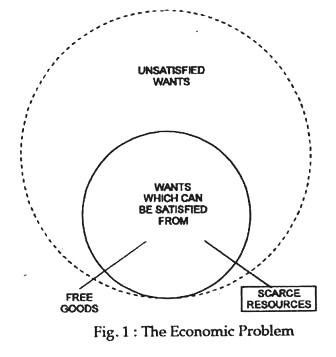In this article we will discuss how economics is the science of choice.
Economics is the scientific study of how people and institutions make decisions about producing and consuming goods and services and how they face the problem of scarcity. It is essentially a study of the ways in which human kind provides for its well-being.
Economists are concerned with the ways in which people apply their knowledge, skills and efforts to the gifts of nature in order to satisfy their material wants. Economics limits itself to the study of material aspects of life.
The starting point of any economic analysis is the existence of human wants. Human wants are unlimited, but human capacity to satisfy the wants is limited. This is the ‘economic problem’ – unlimited wants, very limited means.
ADVERTISEMENTS:
And we cannot overcome this problem completely. All we can do is to make the most of what we have, by exercising our choice. In other words we seek to overcome the problem of scarcity by exercising our choice. We economise, make a careful use of our resources (means) or cut our unnecessary expenditure.
The choice problem has to be faced by an individual or by a family firm or even by a government. A household has to decide what to buy with limited income in order to satisfy the needs of its members. A business firm having limited resources, has to decide what to do to produce and how much of each commodity to produce.
A government has to decide whether to build schools, roads or hospitals with its limited revenue All these activities are competing for the limited revenue it can raise by taxation Extra houses power plants, stadiums and new roads – all are claiming a share of the limited land available. In these and many other instances, the government has to face the task of making the most of the nation’s resources.
The Science of Choice:
ADVERTISEMENTS:
Thus, it is quite clear that economics is really concerned with the problem of choice — the decisions forced upon us by smallness of our resources compared to our unlimited wants (Fig.1). So economics is the science of choice.
Opportunity Cost:
No doubt, resources are scarce. But resources have alternative uses. If more wheat is to be grown, less land will be available for setting up factories. If more tea is exported less will be available for domestic consumption. If more steel is used to construct houses, less steel will be available to build up stadiums and hospitals.
ADVERTISEMENTS:
In economics there is no such thing as free lunch. Having ‘this’ means going without ‘that’. We therefore speak of opportunity cost-the cost of something in terms of alternatives foregone (or, more accurately, in terms of the best alternative sacrificed).
In practice, economising is not so much a complete rejection of one good in favour of another, but rather deciding whether to have a little bit more of one and not quite so much of another. It is principally an adjustment at the margin.
